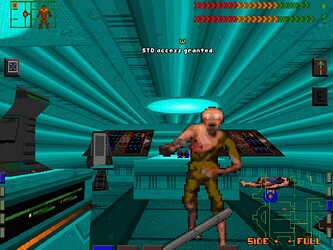Chronologically and mechanically, I suppose the foundational work of the immersive sim oeuvre must be Ultima Underworld: The Stygian Abyss (1992). Thematically, though, a core interest of the genre is the tension between subject and object. To avoid getting too philosophical here, by subject I mean “people” as we think of them in an everyday sense: persons having subjective experiences of life and the world. The object is everything else. In early immersive sim works like Deus Ex and System Shock, the subject is altered–empowered–by becoming more object-like with cybernetic implants (Deus Ex) or neuromods (System Shock).
Usually, there is a price to be paid for these transformations, and affected subjects are often characterized dually as both evolved and degraded. System Shock contrasts this phenomenon with biotechnical transformation. The cybernetically empowered protagonist, known as “the hacker,” must confront a space station filled with formerly-human crew members transmogrified by a horrific virus.
In both cases there is an anxiety–a fear–that a transformation into object might be underway, that a hidden mechanism or infectious agent might rob the protagonist of what makes them human, of their subjectivity.
System Shock 2 (1999) and it’s spiritual descendant Prey (2017) take things even further, and it often feels that the player is confronting a horrific fragility in their nature. Enemies known as “phantoms” (in Prey) are transformed humans, who endlessly repeat human phrases without knowing what they are saying. My personal favorite is “They want to live inside us! Like a disease!” Presumably, this is something a person said or thought before their transformation from subject into object was complete.
This horrific moment in which the subject confronts itself as object, or in which it confronts the possibility of becoming an object (as in infection), or else sees elements of themself as objects (bodily fluids, tissues, etc) is what psychoanalytic critic Julia Kristeva refers to as “abjection.” There is a rich tradition of abject horror in video games. We have powerful responses to representations of the abject because, like representations of the uncanny, they force us to consider where the edge of our humanity is and where it ends.
Abjection is a going concern in the Resident Evil series. Who is infected? Where is the danger? The Alien films are strong examples of abject horror. Possible infections, near-familiar biological “shapes,” fluids, and so forth.
Contaminated Space
KADW
spoilers
Contaminated Space is the story of one person’s encounter with the abject. You might think that because I’ve spent so much time explaining the abject tradition in video games, I’m saying that the story is stale or familiar. Not at all! There are some great touches that make this story its entirely own thing. Who is this protagonist, and why do they do what they do? How did it come to this? Folly? Self-loathing? An isolation so loud that it shouted out everything else?
In reading Contaminated Space for the second time, I consider a different sort of abjection: a bad idea, or an inexplicable tendency. How lonely does someone have to be before they do something incomprehensible, something only vaguely knowable to its acting subject?
You forget the last time you’d spoken to another person. You forget the last person you’d interacted with. Distance seems to distort memory, draw it tight, straining the connection more and more until it snaps, entirely.
The faces of the people you know become blurry, but you never knew them that well.
Can loneliness make an object out of someone? To me, this was the truly terrifying aspect of Contaminated Space. As anyone who has had trouble with mental health might know, sometimes an idea can seem strange to its thinker. While there are plentiful physical details of the protagonist’s transformation, I was mostly drawn to the ways in which they became estranged from humanity before losing it altogether. And, therein, I was afraid.
I think the Petite Mort format is ideal for this work. While constraints can feel like a hardship for authors, I think they became opportunity in this case. We seem to know exactly the right amount about the protagonist, for instance. This is a tight, focused work that does not wear out its welcome. I also think that it shows how IF can do things that other game formats cannot.
…which brings me back to the immersive sim genre. Situating Contaminated Space within a larger tradition of games concerned with transformation and the abject leads me to ask: what interactive problem does abjection solve here? In immersive simulations, the player flirts with the abject in hopes of attaining power. Here, the player must decide whether an abjective transformation can solve a problem (loneliness), and, if so, whether that would be worth it. Shifts in narrative voice make it utterly unclear how much of the protagonist will remain. Is being human more important than escaping isolation? Ultimately, we are invited to consider our options and decide.
As for myself, I already know: there are worse things than being alone.
